|
Books Should Be Free Loyal Books Free Public Domain Audiobooks & eBook Downloads |
|
|
Books Should Be Free Loyal Books Free Public Domain Audiobooks & eBook Downloads |
|
Top Authors |
|---|
|
Book type:
Sort by:
|
By: Anthony Trollope (1815-1882) | |
|---|---|
 Three Clerks (version 2)
Three Clerks (version 2)
Romance and crime in the mid-19th century British Civil Service. In this early novel,Trollope draws on his own experiences as a junior clerk in the General Post Office to provide an entertaining and moving account of how ambition within the service can affect friendship and love. | |
 Christmas at Thompson Hall
Christmas at Thompson Hall
"A Mid-Victorian Christmas Tale"; tells of a night time encounter between relatives who had never before met, resulting in minor injuries, embarassment, and Trollope's usual 'nice' social interactions. | |
 Why Frau Frohmann Raised Her Prices and Other Stories
Why Frau Frohmann Raised Her Prices and Other Stories
A collection of five stories by Anthony Trollope: Why Frau Frohmann Raised Her Prices; The Lady of Launay; Christmas at Thompson Hall; The Telegraph Girl; and Alice Dugdale | |
 Warden (version 3)
Warden (version 3)
The Warden is the first novel in Anthony Trollope's series known as the "Chronicles of Barsetshire", making fun of the Church of England of his time, together with the religious controversies, and the press. It was his fourth novel. The Warden concerns Mr Septimus Harding, the meek, elderly warden of Hiram's Hospital and precentor of Barchester Cathedral, in the fictional county of Barsetshire.The story concerns the impact upon Harding and his circle when a zealous young reformer, John Bold, launches a campaign to expose the disparity in the apportionment of the charity's income between its object, the bedesmen, and its officer, Mr Harding... | |
 Framley Parsonage (version 2)
Framley Parsonage (version 2)
Framley Parsonage is the fourth novel in Anthony Trollope's series known as the Chronicles of Barsetshire. It was first published in serial form in the Cornhill Magazine in 1860, then in book form in 1861.The hero of Framley Parsonage, Mark Robarts, is a young vicar, settled in the village of Framley in Barsetshire with his wife and children. The living has come into his hands through Lady Lufton, the mother of his childhood friend Ludovic, Lord Lufton. Mark has ambitions to further his career and begins to seek connections in the county's high society... | |
By: Anthony Weldon (1583-1648) | |
|---|---|
 Court and Character of King James whereunto Is Now Added the Court of King Charles: Continued unto the Beginning of These Unhappy Times: with Some Observations upon Him Instead of a Character
Court and Character of King James whereunto Is Now Added the Court of King Charles: Continued unto the Beginning of These Unhappy Times: with Some Observations upon Him Instead of a Character
Gossipy exposés of shenanigans at the heart of government are nothing new. The author, Sir Anthony Weldon , was a courtier of years of experience and standing; his account of court intrigues around the Stuart Kings James I and Charles I was written seemingly in the tense period leading up to the English Civil War in the 1640s, and for a private readership . This text, known as the source for the summing up of James I as "the wisest fool in Christendom", gives us an insider's partisan, at times... | |
By: Anton Chekhov (1860-1904) | |
|---|---|
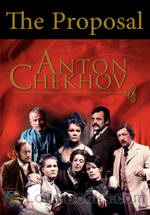 The Proposal
The Proposal
The Proposal is a one act comic farce by Anton Chekhov. In Chekhov’s Russia, marriage was a means of economic stability for most people. They married to gain wealth and possessions. In this play, the concept of marriage is being satirized to show the real purpose of marriage – materialistic gain rather than true love. | |
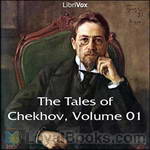 The Tales of Chekhov
The Tales of Chekhov
This is the first of thirteen volumes of Anton Chekhov’s short stories, translated by Constance Garnett. Anton Chekhov was a Russian doctor who turned to fiction as a hobby, and quickly blossomed into one of the masters of the short story genre. Though he is arguably best known for his dramatic works, such as The Cherry Orchard, his stories are widely considered to be some of the most perfect examples of short fiction ever written. Constance Black Garnett was an English housewife who taught herself Russian as a hobby, and subsequently introduced the English-speaking world to some of the greatest Russian authors, including Chekhov and Dostoevsky... | |
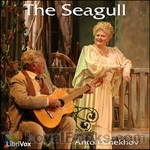 The Seagull
The Seagull
The Seagull (Russian: Чайка, Chayka) is the first of what are generally considered to be the four major plays by the Russian dramatist Anton Chekhov. The play was written in 1895 and first produced in 1896. It dramatises the romantic and artistic conflicts between four characters: the ingenue Nina, the fading leading lady Irina Arkadina, her son the experimental playwright Konstantin Treplyov, and the famous middlebrow story writer Trigorin. | |
 The Cherry Orchard
The Cherry Orchard
The Cherry Orchard is Russian playwright Anton Chekhov's last play. It premiered at the Moscow Art Theatre 17 January 1904 in a production directed by Constantin Stanislavski. Chekhov intended this play as a comedy and it does contain some elements of farce; however, Stanislavski insisted on directing the play as a tragedy. Since this initial production, directors have had to contend with the dual nature of this play. The play concerns an aristocratic Russian woman and her family as they return to the family's estate (which includes a large and well-known cherry orchard) just before it is auctioned to pay the mortgage... | |
 Uncle Vanya
Uncle Vanya
Uncle Vanya (subtitled “Scenes From Country Life”) is a tragicomedy by Anton Chekhov. It is set on the failing country estate of a retired professor, Serebrakoff, who returns after a long absence with his beautiful young wife, and throws the household into confusion. Rivalry, unrequited love, illicit romance, and attempted suicide are the result, punctuated throughout by Chekhov’s sad, wistful humor. | |
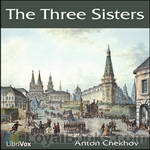 The Three Sisters
The Three Sisters
Three Sisters is a naturalistic play about the decay of the privileged class in Russia and the search for meaning in the modern world. It describes the lives and aspirations of the Prozorov family, the three sisters (Olga, Masha, and Irina) and their brother Andrei. They are a family dissatisfied and frustrated with their present existence. The sisters are refined and cultured young women who grew up in urban Moscow; however for the past eleven years they have been living in a small provincial town... | |
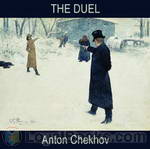 The Duel
The Duel
The plot centres around Laevsky, who is living in a small seaside town in the Caucasus after running away with another man's wife, Nadyezhda Fyodorovna, amid dreams of starting a new life.The dreams have come to nothing as Laevsky idles away his life drinking and playing cards, and Nadyezhda begins to have other affairs.Laevsky's scheme to run away again, this time without his mistress, brings him into conflict with the rationalist Von Koren, who believes in Darwinian principles of natural selection and extinction of the weak and useless.Matters come to a head when an outburst from Laevsky leads to a duel. Von Koren is determined to teach Laevksy a lesson.(Introduction by Phil) | |
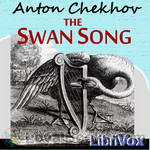 Swan Song
Swan Song
In 'The Swan Song' an aging actor reminisces about his life and the parts he's played. The piece takes a tragic look at ambition and the sacrifices that must be made in order to succeed. Chekhov’s ability to capture and explore human nature and experience is showcased here. | |
 Lady With the Dog and Other Stories
Lady With the Dog and Other Stories
Anton Chekhov was a Russian physician, dramatist and author who is considered to be among the greatest writers of short stories in history. His career as a dramatist produced four classics and his best short stories are held in high esteem by writers and critics. Chekhov practiced as a doctor throughout most of his literary career: "Medicine is my lawful wife", he once said, "and literature is my mistress." Chekhov had at first written stories only for financial gain, but as his artistic ambition grew, he made formal innovations which have influenced the evolution of the modern short story... | |
 House With The Mezzanine And Other Stories
House With The Mezzanine And Other Stories
Six short stories and a novella by the Russian master. (david wales) | |
 Ward No. 6
Ward No. 6
The line between sanity and insanity is blurred in this classic novella by Anton Chekhov. The disillusioned idealist Dr. Rabin is in charge of a provincial lunatic asylum, overseeing with weary, dubious policies a motley group of patients, a group that mirrors in microcosm all of human and especially Russian society. Seeking answers to profound questions, Dr. Rabin enters into dialogues with both staff members and patients, trying to make sense out of what has become of his life, until it becomes less and less clear who is the doctor and who is the patient... | |
 Kashtanka
Kashtanka
"Kashtanka," a shaggy-dog story penned by Anton Chekhov in seven parts and first published in 1887, relates the experiences of its eponymous heroine, a fox-faced, reddish dachshund-mix, whose name means 'little chestnut.' After her detestation of music causes her to become separated from the carpenter with whose family she had been living, Kashtanka finds herself taken up by an unusual vaudevillian and goes to live among an assortment of other intelligent animals, each of whom is observed with the characteristic empathy and humor that stamp Chekhov's work. | |
 Ivanov
Ivanov
Nicolai (anglicised Nicholas in this translation) Ivanov, a middle-aged public servant, is unhappy. His wife Anna, disinherited by her family after converting from Judaism, is dying of tuberculosis. He is deeply in debt. And his best friend’s daughter is infatuated with him. Comedy and tragedy ensue in truly Chekhovian fashion. An example of the young Chekhov’s maturing style, Ivanov is an early harbinger of themes that would recur throughout his work. | |
 Schoolmaster and Other Stories
Schoolmaster and Other Stories
Anton Chekhov, perhaps better known as a world famous classical playwright for works such as "Uncle Vanya" and "The Cherry Orchard" was also a prolific short story writer. "The Schoolmaster and Other Stories" is one of several of his collections. It's a compilation of 30 short stories. Some bizarre, some comical but all very interesting. | |
 Bet and Other Stories
Bet and Other Stories
Thirteen short stories by the master. Summary by david wales | |
 Black Monk
Black Monk
Aspiring academic Andrei Kovrin, while summering in the countryside per the advice of a physician, is haunted by the apparition of a black monk that appears only to him and encourages him in his intellectual pursuits. Although Kovrin is the only one who can see the apparition, the monk assures him that, even if he were a creation of the imagination, he would still be a thing of nature and consequently real. Chekhov uses this vehicle for a gothic exploration into scholarly obsession and madness. - Summary by Daniel Davison | |
 Steppe
Steppe
Little Yegorushka goes off to school for the first time, setting out on the journey in the company of his Uncle Ivan, the local priest Father Christopher, and the fun-loving servant Deniska. Along the way they meet an extraordinarily colorful array of characters, named and nameless: the innkeeper Moisey Moisevitch, the beautiful Countess Dranitsky, the mysterious Varlamov, Emelyan the voiceless singer, Tit the steppe waif, and many more. But the most colorful and extraordinary character of all is the Steppe itself in every mood and weather, painted stroke-by-masterly-stroke by Chekhov in all its wild, musical, redolent, flowering, chirruping, infuriating exuberance. (Expatriate) | |
 Duel (version 2)
Duel (version 2)
Known for his plays and short stories, Anton Chekhov also wrote a series of novellas, astonishing for their psychological complexity and compelling human portraiture. In The Duel, the wastrel and libertine Laevsky absconds to the Caucasus with another man's wife, Nadyezhda Fyodorovna. While there, he forms several acquaintanceships with a colorful array of characters: Von Koren the zoologist, Samoylenko the doctor, and Pobyedov the giddy deacon. Before long, both Laevsky and his mistress succeed in offending local society by their dissolute lifestyles, leading to the inevitable insult, challenge, and duel... | |
 Three Years
Three Years
Laptev, the rich but unattractive scion of a merchant, renounces his independent-minded, intelligent, devoted, but equally unattractive mistress Polina in order to marry the beautiful young gold-digger Yulia. Their life together quickly deteriorates into a loveless agony, Laptev seeking some sort of meaning in his life while Yulia whiles away her youth with the sparkling young Moscow social scene. The compelling question of the story is whether or not Laptev and Yulia can redeem something of lasting value from what seems to be a hopelessly empty relationship... | |
 Anonymous Story
Anonymous Story
In "An Anonymous Story," Chekhov continues to explore his favorite themes of superfluous men, ironic rakes, exploited women, and the dangers of social conventions to human happiness. The Anonymous Narrator is a feckless, would-be revolutionary who gets himself hired on as a flunkey in the household of the young useless aristocrat Orlov, hoping to spy out some useful information for the Cause. Orlov seduces the beautiful Zinaida Fyodorovna away from her husband but quickly tires of her. The Narrator, another in the long line of Russian literary superfluous men, allows Orlov to use him to deceive Zinaida Fyodorovna, hating himself for it all the while... | |
 My Life: The Story of a Provincial
My Life: The Story of a Provincial
A provincial youth of wealth and noble status refuses to employ himself in the typical occupations of the higher classes, thus acquiring a reputation as a lazy good-for-nothing. In reality, he is intensely sensitive to the injustices perpetrated by his social class upon the working classes of town and country, and resolves to become a common laborer, taking employment as a house painter and ikon gilder. All classes of society around him respond to this revolutionary action with bewilderment and ridicule, even the lowest workmen feeling threatened by this insolent shaking of the cosmic structure... | |
By: Antonio Colmenero de Ledesma (d. 17th century) | |
|---|---|
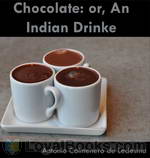 Chocolate: or, An Indian Drinke
Chocolate: or, An Indian Drinke
The Author sings the praises of Chocolate. “By the wise and Moderate use whereof, Health is preserved, Sicknesse Diverted, and Cured, especially the Plague of the Guts; vulgarly called _The New Disease_; Fluxes, Consumptions, & Coughs of the Lungs, with sundry other desperate Diseases. By it also, Conception is Caused, the Birth Hastened and facilitated, Beauty Gain’d and continued.” | |
By: Antonio de Solís (1610-1686) | |
|---|---|
 One Fool Makes Many
One Fool Makes Many
"I will discuss this matter in an allegory: ... There was once upon a time a man, and he had a sister; and this said sister, she had a brother; and so this sister fell in love with another brother, and he had another sister; and one day what should she do, but take it into her head to run away with him? So then, after that, the brother, from whom the sister had been stolen, stole the sister of the thief. Now will you be pleased to tell us whether it would be best, in such a case, that each man should... | |
By: Aphra Behn (1640-1689) | |
|---|---|
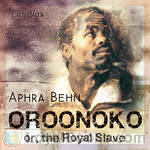 Oroonoko, or The Royal Slave
Oroonoko, or The Royal Slave
Aphra Behn was the first woman writer in England to make a living by her pen, and her novel Oroonoko was the first work published in English to express sympathy for African slaves. Perhaps based partly on Behn’s own experiences living in Surinam, the novel tells the tragic story of a noble slave, Oroonoko, and his love Imoinda. The work was an instant success and was adapted for the stage in 1695 (and more recently by the Royal Shakespeare Company in 1999). Behn’s work paved the way for women... | |
 Rover (Part One)
Rover (Part One)
| |
By: Arabella B. Buckley (1840-1929) | |
|---|---|
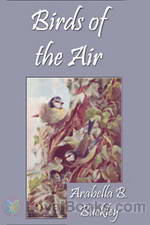 Birds of the Air
Birds of the Air
Arabella Buckley had a great love of nature and wished to impart that love to children. Birds of the Air will encourage children to observe birds in their natural environment and notice the habits of each particular bird they encounter. | |
 Wild Life in Woods and Fields
Wild Life in Woods and Fields
Wild Life in Woods and Fields by Arabella B. Buckley is a collection of stories that will encourage children to become little naturalists and explore the majesty of the great outdoors. This is science taught in such a charming, delightful way that children will learn without even realizing it! | |
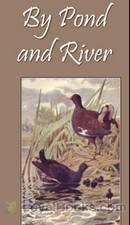 By Pond and River
By Pond and River
In By Pond and River, another of Arabella Buckley’s wonderful science books for children, she explains the habitats of ponds and rivers, exposing children to the animals and plant life that are found there. | |
By: Arabella Buckley (1840-1929) | |
|---|---|
 The Fairyland of Science
The Fairyland of Science
“I have promised to introduce you today to the fairy-land of science — a somewhat bold promise, seeing that most of you probably look upon science as a bundle of dry facts, while fairy-land is all that is beautiful, and full of poetry and imagination. But I thoroughly believe myself, and hope to prove to you, that science is full of beautiful pictures, of real poetry, and of wonder-working fairies…” (From the Introduction to The Fairyland of Science) | |
By: Arabella M. Willson | |
|---|---|
 Lives of the Three Mrs. Judsons
Lives of the Three Mrs. Judsons
This book follows the three amazing stories of Adoniram Judson's wives, Ann, Sarah, and Emily. Each wife went through incredible hardships, but each hardship only proved to make them strong women of faith, who despite all difficulties and illnesses, selflessly gave their strength to the sick and needy. Ann Judson followed Her husband from prison to prison, bribing guards so that she could see him and make his condition a little better. They sacrificed lives of ease, with loving families and friends... | |
By: Archibald Alexander (1874-1942) | |
|---|---|
 Day at a Time and Other Talks on Life and Religion
Day at a Time and Other Talks on Life and Religion
This book [was] written in war-time to minister comfort and, if it may be, to reinforce hope and faith. | |
 Glory in the Grey
Glory in the Grey
It sometimes happens, when we are dispirited, that God's gracious gift of reviving comes to us along a very ordinary channel--in the form, perhaps, of some tonic, heartening passage found in reading, or the "morning face" and cheerful greeting of a friend. That is often all that we need--when our hurt is not serious-- to send us back with a new zest and courage to our tasks; and that is the sort of usefulness which is desired for this book.It does not pretend to deal with the great themes or the great hours of the religious life, but only with some of its simple encouragements and ideals for everyday... | |
By: Archibald Forbes (1838-1900) | |
|---|---|
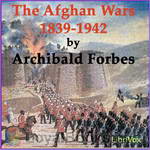 The Afghan Wars 1839-42 and 1878-80, Part 1
The Afghan Wars 1839-42 and 1878-80, Part 1
The First Anglo–Afghan War was fought between British India and Afghanistan from 1839 to 1842. It was one of the first major conflicts during the Great Game, the 19th century competition for power and influence in Central Asia between the United Kingdom and Russia, and also marked one of the worst setbacks inflicted on British power in the region after the consolidation of British Raj by the East India Company. | |
 Afghan Wars 1839-42 and 1878-80, Part 2
Afghan Wars 1839-42 and 1878-80, Part 2
This Part 2 of "The Afghan Wars 1839-42 and 1878-80" discusses the 1878-80 war, which was one of the major conflicts during the Great Game, the 19th century competition for power and influence in Central Asia between the United Kingdom and Russia, and also marked one of the worst setbacks inflicted on British power in the region after the consolidation of British Raj by the East India Company. - Summary by Lynette Caulkins and Phil Griffith | |
By: Archibald Geikie (1835-1924) | |
|---|---|
 Scottish Reminiscences
Scottish Reminiscences
Archibald Geikie was a geologist in Scotland by profession, and a writer. While most of his writings were professional, this is a more personal book telling some of the history of Scotland, Archibald's memories, experiences and recollections there as well as stories he was told by people he met. He has a good sense of humour which shines through. - Summary by Jmbau13 | |
By: Archibald Gracie (1858-1912) | |
|---|---|
 Truth about the Titanic
Truth about the Titanic
Colonel Archibald Gracie was the first survivor of the sinking of the Titanic to die, and this first-hand account was published posthumously. He attempts to dispel some of the rumors surrounding the tragic event and gives his personal observations and an account of his survival clinging to the hull of an overturned collapsible lifeboat after helping many others to escape safely. A large portion of the book is given to personal accounts of other survivors from both the American and British boards of inquiry, boat by boat. - Summary by Larry Wilson | |
By: Archibald Grimké (1849-1930) | |
|---|---|
 William Lloyd Garrison, the Abolitionist
William Lloyd Garrison, the Abolitionist
"THE author of this volume desires . . . to say . . . that it is his earnest hope that this record of a hero may be an aid to brave and true living in the Republic, so that the problems knocking at its door for solution may find the heads, the hands, and the hearts equal to the performance of the duties imposed by them upon the men and women of this generation. William Lloyd Garrison was brave and true. Bravery and truth were the secret of his marvelous career and achievements. May his countrymen and countrywomen imitate his example and be brave and true, not alone in emergent moments, but in everyday things as well." | |
By: Archibald MacMechan (1862-1933) | |
|---|---|
 Chronicles of Canada Volume 27 - The Winning of Popular Government: A Chronicle of the Union of 1841
Chronicles of Canada Volume 27 - The Winning of Popular Government: A Chronicle of the Union of 1841
In the 1830's, Canada was a ideologically divided country. Political upheaval and even riots occurred over Canada's future. Would it remain a subsidiary of England? Would it form its own republic, or even merge with the United States? This work tells of how some of Canada's founding fathers crossed the bridge between past and future. | |
By: Archibald Primrose (1847-1929) | |
|---|---|
 Pitt
Pitt
Archibald Primrose, 5th Earl of Rosebery, liberal prime minister , wrote this short biography of William Pitt, the Younger , the controversial young prime minister who led Great Britain during the terrible trial of the Napoleonic Wars. Lord Rosebery writes: "From the dead eighteenth century his figure still faces us with a majesty of loneliness and courage. There may have been men both abler and greater than he, though it is not easy to cite them; but in all history there is no more patriotic spirit, none more intrepid, and none more pure." | |
By: Archibald Williams (1871-1934) | |
|---|---|
 Romance of Modern Engineering
Romance of Modern Engineering
As it would be impossible to treat, in the compass of a few hundred pages, all the great engineering feats of modern times without reducing individual accounts to uninteresting brevity, the author has preferred, where selection is possible, to take typical instances of engineering practice, and, by the aid of comparatively detailed descriptions, to place the reader in a position to appreciate them and similar undertakings. - Summary by Adapted from the Preface | |
 Romance of Modern Invention
Romance of Modern Invention
This is a volume of exploration into the newest inventions of the turn of the previous century. Journalist Archibald Williams walks the reader through diverse inventions which were changing the world at just that point in time. - Summary by Carolin | |
 Romance of Modern Mechanism
Romance of Modern Mechanism
In 1910, when this book was published, the advancement of modern mechanism was still moving at a rapid pace. It must have seemed like very day, new inventions were made to make life easier. Most of these are still very much in use today, such as the lawn-mower, automatic milking machines in the dairy industry, fire engines, and escalators. Learn about how these worked in this volume. - Summary by Carolin | |
By: Aristophanes (446BC - 385BC) | |
|---|---|
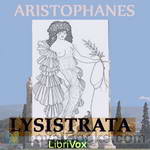 Lysistrata
Lysistrata
Lysistrata read by the Classics Drama Company at DePaul. The Classics Drama Company at DePaul is a new gathering of Thespians and Classicists dedicated to performing and understanding ancient literature. If you live in Chicago and attend DePaul University, we welcome new additions to our group. Contact Dr. Kirk Shellko (kshellko@depaul.edu), if interested.First performed in classical Athens c. 411 B.C.E., Aristophanes’ Lysistrata is the original battle of the sexes. One woman, Lysistrata, brings together the women of all Greece, exhorting them to withhold sexual contact from all men in order that they negotiate a treaty... | |
 Lysistrata (version 3)
Lysistrata (version 3)
The women of Athens are sick of the Peloponnesian war that has dragged on for year after year after year, causing great hardship to everyone. They decide to deny the men sex until they agree to make peace, using the one thing that perhaps men enjoy more than killing each other. Does it work? Listen and find out. This comedy by Aristophanes was first performed in 411 BC | |
 Lysistrata (version 2)
Lysistrata (version 2)
Lysistrata has had enough. She is tired of the constant war that is ravaging Greece and has come up with a solution: Together with female friends from other Greek cities, she persuades all women of Greece to pledge an oath and refrain from all sexual contact with their husbands and lovers. The idea is that what men really want is sex, and that they are willing to do anything to get it - even abandoning their pride and make peace. And while the Athenian women retreat into the sacred Acropolis, the men gather outside and debate what is to be done... | |
By: Aristotle (384-322) | |
|---|---|
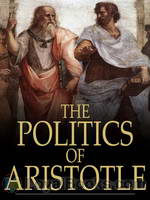 Politics
Politics
The Politics, by the ancient Greek philosopher Aristotle, is one of the most influential texts in political philosophy. In it, Aristotle explores the role that the political community should play in developing the virtue of its citizens. One of his central ideas is that “Man is a political animal,” meaning that people can only become virtuous by active participation in the political community. Aristotle also criticizes his teacher Plato, classifies and evaluates six different types of constitutions and political institutions, and describes his vision of the ideal state... | |
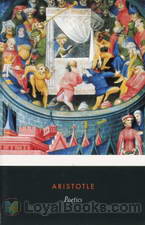 Poetics
Poetics
Aristotle’s Poetics from the 4th century B.C. aims to give a short study of storytelling. It discusses things like unity of plot, reversal of situation, and character in the context of Greek tragedy, comedy and epic poetry. But it still applies today. It is especially popular with screenwriters as seen in many script gurus’ how-to books. | |
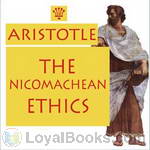 The Nicomachean Ethics
The Nicomachean Ethics
The work consists of ten books, originally separate scrolls, and is understood to be based on notes said to be from his lectures at the Lyceum which were either edited by or dedicated to Aristotle's son, Nicomachus. In many ways this work parallels the similar Eudemian Ethics, which has only eight books, and the two works can be fruitfully compared. Books V, VI, and VII of the Nicomachean Ethics are identical to Books IV, V, and VI of the Eudemian Ethics. Opinions about the relationship between the two works, for example which was written first, and which originally contained the three common books, is divided... | |
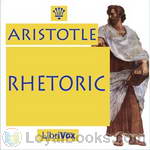 Rhetoric
Rhetoric
The Rhetoric was developed by Aristotle during two periods when he was in Athens, the first between 367 to 347 BCE (when he was seconded to Plato in the Academy), and the second between 335 to 322 BCE (when he was running his own school, the Lyceum). The Rhetoric consists of three books. Book I offers a general overview, presenting the purposes of rhetoric and a working definition; it also offers a detailed discussion of the major contexts and types of rhetoric. Book II discusses in detail the three means of persuasion that an orator must rely on: those grounded in credibility (ethos), in the emotions and psychology of the audience (pathos), and in patterns of reasoning (logos)... | |
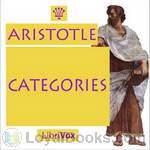 Categories
Categories
Categories is the first of Aristotle's six texts on logic which are collectively known as the Organon. In Categories, Aristotle enumerates all the possible kinds of things that can be the subject or the predicate of a proposition. Aristotle places every object of human apprehension under one of ten categories (known to medieval writers as the praedicamenta). Aristotle intended them to enumerate everything that can be expressed without composition or structure, thus anything that can be either the subject or the predicate of a proposition. The ten categories, or classes, are: Substance, Quantity, Quality, Relation, Place, Time, Position, State, Action and Affection. | |
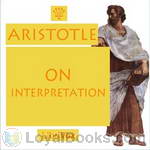 On Interpretation
On Interpretation
Aristotle's On Interpretation (Greek Peri Hermeneias) or De Interpretatione (the Latin title) is the second of Aristotle's six texts on logic which are collectively known as the Organon. On Interpretation is one of the earliest surviving philosophical works in the Western tradition to deal with the relationship between language and logic in a comprehensive, explicit, and formal way. The work begins by analyzing simple categoric propositions, and draws a series of basic conclusions on the routine... | |
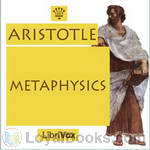 Metaphysics
Metaphysics
Metaphysics is essentially a reconciliation of Plato’s theory of Forms that Aristotle acquired at the Academy in Athens, with the view of the world given by common sense and the observations of the natural sciences. According to Plato, the real nature of things is eternal and unchangeable. However, the world we observe around us is constantly and perpetually changing. Aristotle’s genius was to reconcile these two apparently contradictory views of the world. The result is a synthesis of the naturalism of empirical science, and the mysticism of Plato, that informed the Western intellectual tradition for more than two thousand years... | |
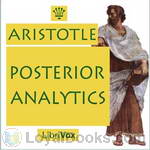 Posterior Analytics
Posterior Analytics
Posterior Analytics is the fourth of Aristotle's six texts on logic which are collectively known as the Organon ("Instrument"). Posterior Analytics deals with demonstration, definition, and scientific knowledge. Demonstration is distinguished as a syllogism productive of scientific knowledge, while Definition is marked as the statement of a thing's nature, a statement of the meaning of the name, or of an equivalent nominal formula. | |
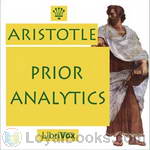 Prior Analytics
Prior Analytics
Prior Analytics is the third of Aristotle's six texts on logic which are collectively known as the Organon ("Instrument"). In Prior Analytics Aristotle conducts a formal study of arguments. In logic an argument is a series of true or false statements which lead to a true or false conclusion. Aristotle identifies valid and invalid forms of arguments called syllogisms. A syllogism is an argument consisting of three sentences: two premises and a conclusion. Of the entire Aristotelian corpus, Aristotle gives priority to the study of his treatises on Logic. | |
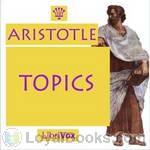 Topics
Topics
The Topics is is the fifth of Aristotle's six texts on logic which are collectively known as the Organon ("Instrument"). The Topics constitutes Aristotle's treatise on the art of dialectic—the invention and discovery of arguments in which the propositions rest upon commonly-held opinions or endoxa. Topoi are "places" from which such arguments can be discovered or invented. In his treatise on the Topics, Aristotle does not explicitly define a topos, though it is "at least primarily a strategy for argument not infrequently justified or explained by a principle." | |
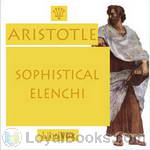 Sophistical Elenchi
Sophistical Elenchi
De Sophisticis Elenchis is the sixth of Aristotle's six texts on logic which are collectively known as the Organon ("Instrument"). In De Sophisticis Elenchis Aristotle identifies 13 falacies. Verbal Fallacies are: Accent or Emphasis; Amphibology; Equivocation; Composition; Division and Figure of Speech. Material Fallacies are: Accident; Affirming the Consequent; Converse Accident; Irrelevant Conclusion; Begging the Question; False Cause and Fallacy of Many Questions. | |
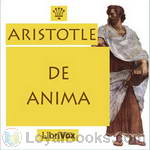 De Anima
De Anima
On the Soul (Greek Περὶ Ψυχῆς (Perì Psūchês), Latin De Anima) is a major treatise by Aristotle on the nature of living things. His discussion centres on the kinds of souls possessed by different kinds of living things, distinguished by their different operations. Thus plants have the capacity for nourishment and reproduction, the minimum that must be possessed by any kind of living organism. Lower animals have, in addition, the powers of sense-perception and self-motion (action). Humans have all these as well as intellect... | |
 On the Heavens
On the Heavens
On the Heavens (Greek: Περί ουρανού, Latin: De Caelo or De Caelo et Mundo) is Aristotle's chief cosmological treatise. In it Aristotle argues that the Earth is a sphere by pointing to the evidence of lunar eclipses. Aristotle also provides a detailed explanation of his theory of 'gravity' arguing that things which contain 'earth' fall towards the centre of the Universe because 'earth' is naturally attracted to the centre of the Universe. Aristotle argues that if the planet Earth was moved to the location of the Moon then objects which contain 'earth' would not fall towards the centre of the Earth but rather towards the centre of the Universe... | |
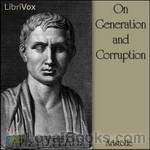 On Generation and Corruption
On Generation and Corruption
On Generation and Corruption (Ancient Greek: Περὶ γενέσεως καὶ φθορᾶς, Latin: De Generatione et Corruptione, also known as On Coming to Be and Passing Away) is a treatise by Aristotle. Like many of his texts, it is both scientific and philosophic (although not necessarily scientific in the modern sense). The philosophy, though, is essentially empirical; as in all Aristotle's works, the deductions made about the unexperienced and unobservable are based on observations and real experiences... | |
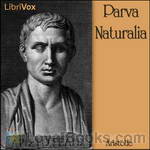 Parva Naturalia
Parva Naturalia
Parva Naturalia [the "short treatises on nature" (a conventional Latin title first used by Giles of Rome)] is a collection of books by Aristotle, which discuss natural phenomena involving the body and the soul. The books are as follows:I - On Sensation and the SensibleII - On Memory and RecollectionIII - On Sleeping and WakingIV - On DreamsV - On Prophecy in SleepVI - On Longevity and Shortness of LifeVII - On Youth and Old Age, Life and Death VIII - On Respiration | |
 Meteorology, On the Universe & On Breath
Meteorology, On the Universe & On Breath
Meteorology by Aristotle Translated by Erwin Wentworth Webster before he fell in action in 1917. Book I: The Celestial Sphere, Stars & Precipitation Book II: Seas, Winds & Earthquakes Book III: Halos, Rainbows & Mock Suns Book IV: The Elements & Secondary Qualities On the Universe is attributed to Aristotle but may have been written by Posidonius the Stoic or someone well acquainted with his work. Two candidates for the Alexander addressed in the text are Alexander the Great and Tiberius Claudius Alexander, nephew of Philo Judaeus and Procurator of Judaea, and in A... | |
 Opuscula
Opuscula
Opuscula is a collection of shorter books that may or may not have been written by Aristotle. 1. On Colours 2. On Things Heard 3. Physiognomonics 4. On Plants 5. On Marvellous Things Heard 6. Mechanics 7. On Indivisible Lines 8. The Situations and Names of Winds 9. On Melissus, Xenophanes, and Gorgias - Summary by Geoffrey Edwards | |
 On the Parts of Animals
On the Parts of Animals
On the Parts of Animals by Aristotle . The first book asks whether animals were designed or came into existence by chance. The remaining three books focus on particular examples of various animals and the functions of their organs. The translator William Ogle, who was both a medical doctor and classicist, presented Charles Darwin with a copy of this translation. | |
 History of Animals
History of Animals
Book I Grouping of animals and the parts of the human body. Book II Different parts of red-blooded animals. Book III Internal organs. Book IV Animals without blood . Books V & VI Animal reproduction. Book VII Human reproduction. Book VIII Habits . Book IX Social behavior. Book X Dealing with barrenness in women was excluded from the translation of D'Arcy Thompson for being spurious so the translation of the Clergyman Richard Cresswell is used instead. Sir D'Arcy Wentworth Thompson was a biologist, mathematician and classicist who also wrote On Growth and Form which discusses the mathematical patterns and structures formed in plants and animals. | |
 Movement & Progression of Animals
Movement & Progression of Animals
Movement of Animals begins with a discussion of the physics of motion and asks whether God, the Unmoved Mover, exists outside of our Universe. Progression of Animals asks why animals have the parts they do and to what end these parts are possessed. - Summary by Geoffrey Edwards | |
 Generation of Animals
Generation of Animals
Generation of Animals ; Latin: De Generatione Animalium) Book 1: Sexual Parts, Semen & Sexual Generation Book 2: Sexes, Embryo Development & Sterility Book 3: Birds, Fish, Cephalopods, Insects, Bees & Testacea Book 4: Causes of Sex, Heredity & Teratology Book 5: Distinction between Necessity and the Final Cause Charles Darwin wrote: "Linnaeus and Cuvier have been my two gods, though in very different ways, but they were mere schoolboys to old Aristotle." - Summary by Geoffrey Edwards | |
By: Arlo Bates (1850-1918) | |
|---|---|
 Intoxicated Ghost And Other Stories
Intoxicated Ghost And Other Stories
A charming collection of short stories, dealing with ghosts, magic, and other-worldly events that even the faint of heart will enjoy. 1. The Intoxicated Ghost - a woman tries to outsmart a ghost to save the family from financial ruin. 2. A Problem In Portraiture - can a man's portrait influence the man he becomes? 3. Knitters In The Sun - will a father's curse keep two lovers apart? 4. A Comedy In Crape - the death of the town playboy causes a dispute over who is entitled to be chief mourner 5. A Meeting Of The Psychical Club - who is the hooded stranger, and are his powers real? 6... | |
By: Armando Palacio Valdés (1853-1938) | |
|---|---|
 Christmas Stories from French and Spanish Writers
Christmas Stories from French and Spanish Writers
Fifteen short stories by Antoinette Ogden from French and Spanish writers of many times. | |
By: Armen Garo (1872-1923) | |
|---|---|
 Why Armenia Should Be Free: Armenia's Role in the Present War
Why Armenia Should Be Free: Armenia's Role in the Present War
Here is a trenchant argument for the Allied Supreme Council, established at the close of World War One, to recognize and defend the independence of Armenia and its people. Responding to President Wilson's call for the sovereignty of those who fought for self-determination during the war, the author outlines his people's suffering and their efforts to earn recognition of their nationhood by joining the Entente in fighting against tyranny. | |
By: Armin Stein (1840-1929) | |
|---|---|
 Katharine von Bora: Dr. Martin Luther's Wife
Katharine von Bora: Dr. Martin Luther's Wife
This is a fictionalized biography of the wife of the reformer Dr. Martin Luther. In the author's words, he hopes that "people may learn to know the wife of its greatest man,—not by name only, but as her husband's 'helpmeet,' in the truest sense of the word, as a pattern of domestic virtue, and as a pearl among women." - Summary by Dory Smith | |
By: Arnold Bennett (1867-1931) | |
|---|---|
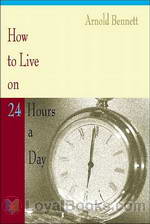 How to Live on Twenty-Four Hours a Day
How to Live on Twenty-Four Hours a Day
This book is a classic piece on self improvement teaching you to live to the fullest. Judging from the title of the book, the reader might expect that the book is a manual on how to manage your time better. Nothing could be further from the truth, this book is a flowery and witty self help book aimed at helping readers improve the quality of their lives, in fact it is one of the firsts of its kind in the world. Bennett describes the twenty four hours in a day as a miracle and that it should be used for the betterment of health, wealth, respect, pleasure and contentment... | |
 Mental Efficiency and Other Hints to Men and Women
Mental Efficiency and Other Hints to Men and Women
Mental Efficiency and Other Hints to Men and Women is one of the many self help books that Bennett wrote, the most famous of these being How to Live 24 Hours a Day. It is highly readable, amusing and offers wisdom in an extremely palatable form. Bennett's gift for analysis and his knowledge of philosophy and psychology make this book a valuable treasure trove of handy hints to improve our lives. Though it was first published in 1911, it remains as relevant, wise and useful as it did more than a hundred years ago... | |
 The Card
The Card
The ‘Card’ in question is Edward Henry Machin – his mother called him ‘Denry.’This light-hearted story is of his rise from humble beginnings as the son of a washerwoman and sempstress in the last quarter of the nineteenth century, in the pottery towns (which Arnold Bennett christened ‘The Five Towns’) of the English Midlands; how, by his own wits, enterprise and ‘nerve’ he rose to wealth, married bliss and public recognition as the youngest-ever mayor of his home town. “’And yet,’ demanded Councillor Barlow, ‘what’s he done? What great cause is he identified with?’‘He’s identified,’ said the speaker, ‘with the great cause of cheering us all up’.” | |
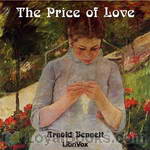 The Price of Love
The Price of Love
Rachel Louise Fleckring works for the elderly Mrs Maldon, and although with the woman for only a short time, she is taken into the heart of the family. She falls in love with one of Mrs Maldon’s descendents, but along the way, she has to come to terms with the fact that he isn’t, perhaps, the perfectly honest man she thought he was. | |
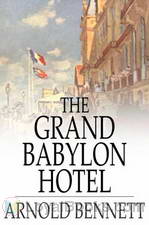 The Grand Babylon Hotel
The Grand Babylon Hotel
Theodore Racksole, a rich American multi-millionaire, buys the Grand Babylon Hotel, a luxurious hotel in London, as a whim – and then finds out there are strange things going on – a German prince is supposed to arrive but never turns up, someone is found murdered in the hotel, but then the body disappears. With the help of his independent daughter Nella and another German prince, Racksole sets out to solve the mystery.Bennett wrote this as a 15-part serial, for a lark, in 15 days, and sold it for 100 pounds. It first appeared in The Golden Penny in 1902, which described it as “the most original, amusing, and thrilling serial written in a decade”. | |
 The Old Wives' Tale
The Old Wives' Tale
The Old Wives’ Tale is a novel by Arnold Bennett, first published in 1908. It deals with the lives of two very different sisters, Constance and Sophia Baines, following their stories from their youth, working in their mother’s draper’s shop, into old age. It is generally regarded as one of Bennett’s finest works. It covers a period of about 70 years from roughly 1840 to 1905, and is set in Burslem and Paris. | |
 Literary Taste: How to Form It
Literary Taste: How to Form It
Arnold Bennett describes a method for enjoying literature, and suggests the contents of a comprehensive library. Chapters 1-10 and 14 describe his method for learning to enjoy literature. Chapters 11, 12, and 13 contain detailed lists of the 337 volumes required to complete a comprehensive library of English works. This reading is from the 1913 version at Project Gutenberg, and so does not contain the revisions made by Swinnerton for the 1939 edition, which included authors of the early Twentieth Century. Swinnerton’s revisions are available from Wikipedia. | |
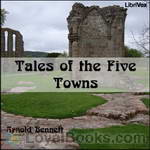 Tales of the Five Towns
Tales of the Five Towns
This is a selection of short stories recounting, with gentle satire and tolerant good humour, the small town provincial life at the end of the nineteenth century, based around the six towns in the county of Staffordshire, England, known as the Potteries. Arnold Bennett chose to fictionalize these towns by changing their names and omitting one (Fenton) as he apparently felt that “Five Towns” was more euphonious than “Six Towns”. The real town names which are thinly disguised in the novel are: Hanley, Longton, Burslem and Tunstal, the fifth, Stoke became “Knype”... | |
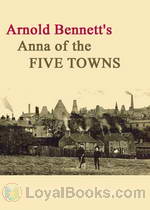 Anna of the Five Towns
Anna of the Five Towns
The plot centers on Anna Tellwright, daughter of a wealthy but miserly and dictatorial father, living in the Potteries area of Staffordshire, England. Her activities are strictly controlled by the Methodist church. Having escaped her father by marrying the respectable and attractive Henry, she attempts in vain to help Willy, son of a drunken and bankrupt business associate of her father's. | |
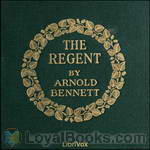 The Regent
The Regent
'The Regent' is, if not a sequel to 'The Card', then a 'Further Adventures of' the eponymous hero of that novel.Denry Machin is now forty-three and begins to feel that he is getting old, that making money and a happy home life are not enough and that he has lost his touch as the entrepreneur and entertainer of the 'Five Towns'.In fact, as he says to himself 'What I want is change - and a lot of it too!'. A chance meeting at the local theatre leads to his going to London and then... | |
 Self and Self-management: Essays about Existing
Self and Self-management: Essays about Existing
Bennett's essays always provide food for thought and bring a wry smile to the lips. Human nature, it appears, changes little over the ages, and Bennett's writing stands the test of time, though in the case of some of the essays in this eclectic collection, it is well to remember that they were written at the time of the First World War and the fight for women's suffrage. | |
 The Human Machine
The Human Machine
Bennett asks us to consider our brains as the most wonderful machine, a machine which is the only thing in this world that we can control. As he writes: "I am simply bent on calling your attention to a fact which has perhaps wholly or partially escaped you -- namely, that you are the most fascinating bit of machinery that ever was."As ever, his prose is honeyed, his thoughts inspired, and his advice as relevant today as when it was written. (Introduction by Ruth Golding) | |
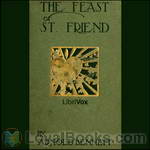 The Feast of St. Friend
The Feast of St. Friend
In The Feast of St. Friend, a Christmas book, Arnold Bennett shares his views on Christmas as the season of goodwill. As always, Bennett's writing includes some thought-provoking ideas liberally spiced with his wry sense of humour, and as always too, you can barely believe it was written so long ago. This was published exactly 100 years ago, in 1911. (Introduction by Ruth Golding) | |
 Hilda Lessways
Hilda Lessways
This book is the second in Bennett’s four books about life in the Five Towns (the real life Potteries in Staffordshire). It tells the story of Hilda before her marriage to Edwin Clayhanger (from the first book). Bennett explores Hilda's ambition to make a career for herself, her coming of age and her working experiences as a shorthand clerk and keeper of a lodging house in London and Brighton. He also shows her intensifying relationship with the enigmatic George Cannon that ends in her disastrous bigamous marriage and pregnancy, and finally her reconciliation with Edwin Clayhanger | |
 Clayhanger
Clayhanger
This first of a trilogy of novels is a coming-of-age story set in the Midlands of Victorian England, following Edwin Clayhanger as he leaves school, takes over the family business, and falls in love.The books are set in Bennett's usual setting of "the 5 Towns", a thinly-disguised version of the six towns of "the Potteries" which amalgamated (at the time of which Bennett was writing) into the borough (and later city) of Stoke-on-Trent.In one of the earlier chapters in the book, Bennett writes that... | |
 Buried Alive
Buried Alive
The hero is Mr Priam Farll, a painter of considerable ability. He is, however, extremely shy – so shy that when his valet, Henry Leek, dies suddenly, the doctor believes the dead man to be Priam Farll and the live man the valet. The artist does not try to disabuse him. After the funeral (in Westminster Abbey), Priam Farll marries a widow and lives a happy life until the loss of his wife’s money means he has to take up painting again. A connoisseur of art recognises his style but thinks the paintings are by an imposter... | |
 Pretty Lady
Pretty Lady
‘The Pretty Lady’ is considered to be one of Bennett's most revealing and under-rated works. It is the story of a French prostitute, Christine, who has escaped from wartime Ostend, and set herself up in business in London. Though a refugee, she demands no pity; she is self-sufficient, practical and realistic. Christine is not a harpy preying on innocent soldiers, but a canny businesswoman, doing the best she can with the opportunities life has given her. Her main relationship is with G.J. Hoape, a wealthy man above the military age... | |
 Ghost: A Modern Fantasy
Ghost: A Modern Fantasy
The novel opens with Carl Foster, a recently qualified doctor, coming to London to try and make his fortune. He meets a famous tenor, Signor Alresca, who suffers a dreadful injury backstage and Foster tends to him. He thus meets the lead soprano, Rosetta Rosa, and falls hopelessly in love with her.Alresca takes Foster under his wing and they travel to Alresca's home in Bruges. It is clear to Foster that Alresca has some strange obsession. Foster also notices a stranger who seems to be dogging his footsteps.Things take an even more sinister turn when Alresca inexplicably dies. . . | |
 Matador of the Five Towns and Other Stories
Matador of the Five Towns and Other Stories
Twenty-two short stories by Arnold Bennett, mainly set in the 'Five Towns', Bennett's name for the pottery manufacturing towns of the English midlands | |
 These Twain
These Twain
Hilda is saved from destitution by Edwin Clayhanger who marries her. The two, with Hilda's son by her disastrous 'marriage' to George Cannon, are living in Bursley. Edwin does not enjoy an entirely happy marriage with Hilda because of her outspokenness. Hilda has strong opinions on matters which at the time were considered to be a male preserve – for example, on Edwin’s business. She also does things without telling him. As a consequence, Edwin has his doubts about their marriage and is angered by his wife just as he had been by his father... | |
 Roll-Call
Roll-Call
"The Roll-Call" is the sequel to the Clayhanger trilogy. This book concerns the young life of Clayhanger's stepson, George. George Edwin Cannon (he quickly dropped the surname Clayhanger), is an architect, in many ways representing the ambitions held by his stepfather, Edwin. However, he possesses an arrogance endowed by family wealth and Bennett examines with some aplomb the difficulty of bringing up children without spoiling them. George eventually joins the army and this is a fitting finale to this fine series. | |
 How to Live on 24 Hours a Day (version 2)
How to Live on 24 Hours a Day (version 2)
Are you really 'living', or just existing? Do you want to improve yourself or just continue to muddle through? Do you use the time given you each day, or just throw most of it away? These questions Bennett asks each of us and for those who want to really live and learn, offers very valuable advice. Time is the most precious of commodities states Bennett in this book. Many books have been written on how to live on a certain amount of money each day. And he added that the old adage "time is money" understates the matter, as time can often produce money, but money cannot produce more time... | |
 Old Adam
Old Adam
Edward Henry Machin, whose rise from humble beginnings to prosperity was told in 'The Card', leads a comfortable life in the English Midlands 'Five Towns'. Yet when he unexpectedly gains three hundred and forty-one pounds in a speculation on rubber shares, he realises that he doesn't 'feel so jolly, after all'. After a visit to the local music hall, he decides that a change is in order. He takes the morning train to London, where adventures in the theatrical world await. 'The Old Adam' was also published under the title, 'The Regent'. | |
 Loot Of Cities
Loot Of Cities
Published in 1917, this is a collection of a novella and seven short stories by one of the cleverest authors of the early twentieth century. ‘In Queen's Quorum , a survey of crime fiction, Ellery Queen listed Bennett's The Loot of Cities among the 100 most important works in the genre. This collection of stories recounts the adventures of a millionaire who commits crimes to achieve his idealistic ends. Although it was "one of his least known works," it was nevertheless "of unusual interest, both as an example of Arnold Bennett's early work and as an early example of dilettante detectivism".’ - Summary by David Wales | |